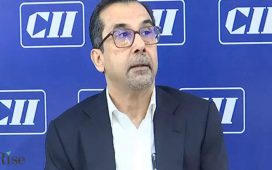
In an interaction with ET Online, Vivek Juneja, Founder and Managing Director, says the company’s warehousing services leverage advanced digital technologies to boost accuracy and efficiency, providing value-added services like kitting and returns handling. He asserts that the digitisation of logistics is transforming supply chain efficiency, and the supply chain firms that don’t join the bandwagon risk lagging behind. Edited excerpts:
ET: How is digitisation in logistics transforming end-to-end supply chain efficiency for businesses, and what specific technologies are driving this change?
Digitisation in logistics is transforming supply chain efficiency, helping businesses streamline operations and boost productivity. Technologies like the Internet of Things (IoT), artificial intelligence (AI), data analytics and warehouse management systems (WMS) are key drivers of this transformation. Today, IoT enables real-time tracking and monitoring of shipments, inventory and vehicles through interconnected devices and sensors. AI algorithms optimise routes, predict demand and automate decision-making, reducing errors and improving efficiency. Data analytics provide insights into supply chain performance, aiding informed decision-making and continuous improvement. WMS automates and integrates warehouse operations, enhancing accuracy and efficiency. These technologies improve visibility, resource allocation and cost management across the supply chain.ET: What technologies and unique solutions is Varuna Group leveraging to boost efficiency and cater to a diverse range of customers?
Varuna Group is leveraging multiple technologies that bring efficiency to its processes. Electronic lorry receipt (ELR) is an example. It integrates with the government e-way bill portal to automatically fetch load details and generate digital booking receipts and e-invoices for seamless documentation. Our e-invoicing and payment integration works with GST service providers to automate e-invoice generation and submission. Payments to vendors are directly transferred to their accounts, while drivers receive digital payments to their cards, ensuring timely and secure transactions.
Towards better fuel management, we partner with major fuel companies to transfer fuel amounts directly to drivers’ diesel cards, automating transaction processing. Additionally, our 24/7 central control tower geofences all customer locations and warehouses, providing automated vehicle arrival and departure updates. Real-time consignment tracking is also managed.
Our vendor portal facilitates a bidding process for vehicle availability, allowing vendors to quote rates and check payment statuses securely through OTP-based authentication. Our control tower monitors vehicles around the clock, taking appropriate actions based on alerts received. Our customer portal allows customers to track shipments and access automated status updates. Over 90% of documents are digitised, and over 80% of MIS reports are automated, ensuring timely and accurate information delivery.
Varuna Group’s digital initiatives enhance flexibility, responsiveness, and cost-effectiveness, enabling businesses to detect and resolve issues proactively, shorten lead times, and improve customer satisfaction. Digitising logistics is not only a technological advancement but also a strategic necessity for companies to thrive in today’s competitive environment.
ET: What innovative solutions have you adopted to promote sustainability in logistics, and how do these drive best practices in the industry?
The importance of sustainability in supply chain management is undeniable. As environmental awareness grows, adopting sustainable practices in 3PL logistics in India reduces operational impacts and ensures long-term success. Wastefulness harms the environment and affects a company’s bottom line. Eco-friendly logistics strategies protect the planet and enhance prosperity, making sustainability crucial in supply chain management.
As I see, innovative logistics solutions are driving sustainability and boosting supply chain efficiency. One notable innovation is a carbon footprint calculator developed with Climes. This tool allows clients to measure, analyse and optimise their environmental impact in real time, reducing carbon emissions across operations. Using advanced data analytics and machine learning, businesses can pinpoint areas for improvement and implement targeted strategies to minimise their environmental footprint.
Varuna Group also champions energy-efficient technologies to cut energy consumption and waste in warehouses. They employ sustainable materials, energy-efficient lighting, and proper insulation. Additionally, they optimise logistics through efficient routing, preventive maintenance, and driver training, significantly reducing emissions and environmental impact.
Wastage in logistics includes inefficiencies and losses at various stages of the supply chain. Efficient inventory management, including just-in-time principles, helps maintain optimal stock levels, reducing overstocking, product obsolescence, and excessive carrying costs. This aligns with sustainability principles and boosts operational efficiency.
ET: What best practices have you implemented to reduce inventory management issues and order fulfilment delays?
Indian warehousing and logistics providers employ several best practices to mitigate inventory management issues, reduce order fulfilment delays, and ensure compliance with regulations. At Varuna Group, we have adopted a comprehensive approach that integrates advanced technologies and strict operational guidelines.
Utilising advanced digital technologies and robust quality management systems, we maximise efficiency. We also boast a flexible warehousing system, whereby our warehousing capacity can be tailored to meet the evolving needs of our customers without compromising quality. For efficient inventory management, we utilise WMS to monitor stock levels in real-time and forecast demand. This helps optimise stock levels, reducing the risk of stockouts or overstocking. Additionally, practices such as post-pick audits, cycle counts, touch bin counts, and blind counting inventory during unloading ensure accurate stock levels. We also conduct post-pick audits of dispatched stock and implement CAPA for all stock-related issues. Location management and capacity are defined in the WMS system to control and monitor location accuracy.
To address order fulfilment delays, we prioritise streamlined processes and invest in technologies like automated storage and retrieval systems (AS/RS) and barcode scanning. These technologies enhance warehouse operations, improve order accuracy, and expedite fulfilment processes. HHT-based picking and put-away processes further enhance efficiency. Additionally, we address common causes of fulfilment delays, such as inventory visibility issues, WMS vs. physical inventory mismatch, and untrained resources.
ET: How does Varuna Group ensure compliance with regulations and industry standards in its operations, and what specific guidelines and certifications are part of your compliance checklist?
Compliance with regulations and industry standards is ensured through strict adherence to guidelines for safety, security, and environmental sustainability. Regular audits, training programmes based on customer complaints, and corrective actions (CAPA) for all stock-related issues help maintain compliance and uphold industry standards.
Our compliance checklist includes the change of land use (CLU), power load sanction letter, PCB (Pollution Control Board) certificate for genset, fire NOC, shop & establishment certificate, GST registration, legal compliance certification, approved building structure, floor strength certificate, pollution NOC, chartered engineer certificate for electrical safety, building insurance. We also look for environmental clearance from the State Expert Appraisal Committee/State Environment Impact Assessment Authority (SEAC/SEIAA), Building Safety Certificate, Structural Safety Certificate, including seismic zone clearance, and Central Ground Water Authority (CGWA) permission. We believe that Indian warehouses and logistics companies, by adhering to such best practices, can substantially enhance their operational effectiveness, reduce delays, and ensure compliances.









